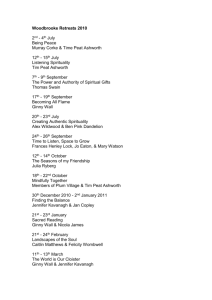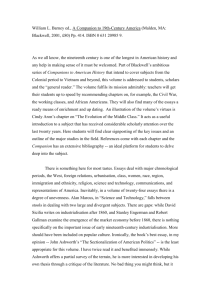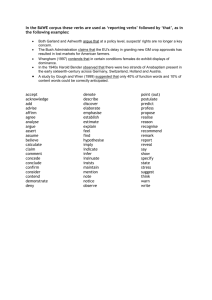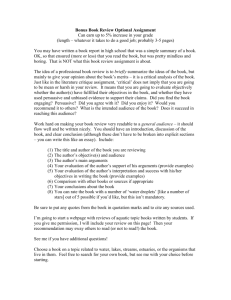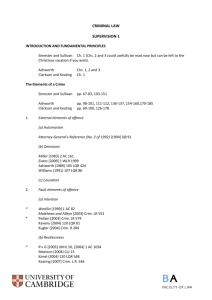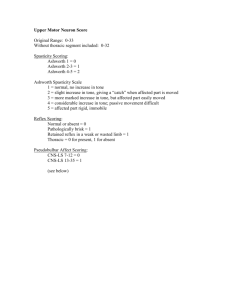Policy Information Student Handbook Grading
advertisement
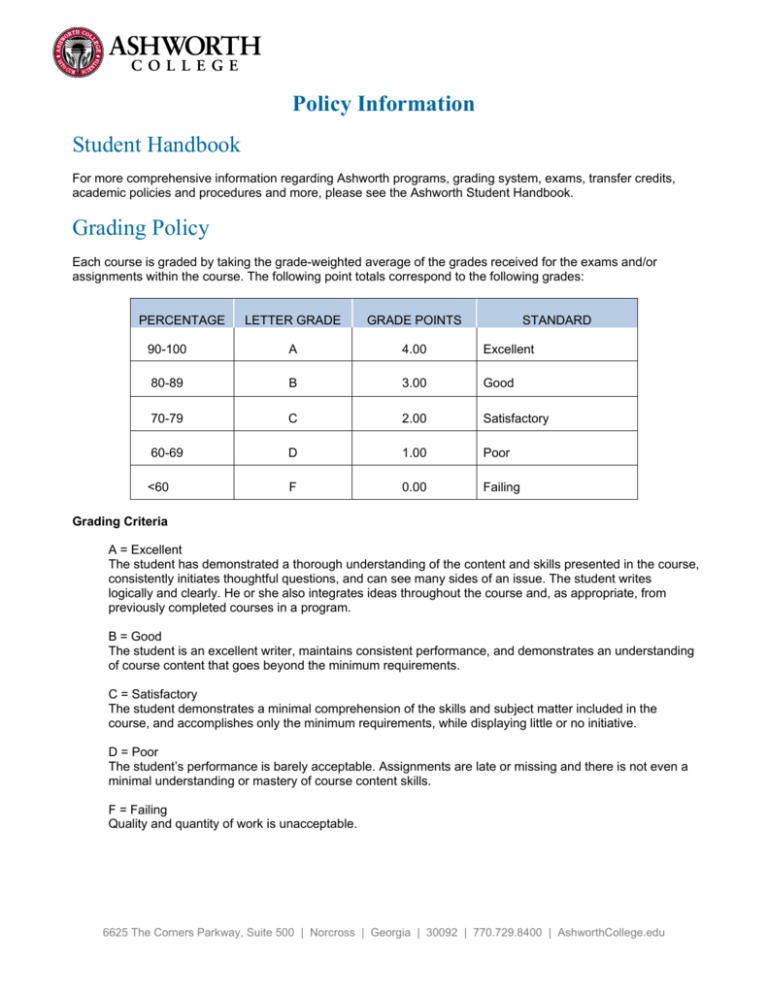
Policy Information Student Handbook For more comprehensive information regarding Ashworth programs, grading system, exams, transfer credits, academic policies and procedures and more, please see the Ashworth Student Handbook. Grading Policy Each course is graded by taking the grade-weighted average of the grades received for the exams and/or assignments within the course. The following point totals correspond to the following grades: PERCENTAGE LETTER GRADE GRADE POINTS STANDARD 90-100 A 4.00 Excellent 80-89 B 3.00 Good 70-79 C 2.00 Satisfactory 60-69 D 1.00 Poor <60 F 0.00 Failing Grading Criteria A = Excellent The student has demonstrated a thorough understanding of the content and skills presented in the course, consistently initiates thoughtful questions, and can see many sides of an issue. The student writes logically and clearly. He or she also integrates ideas throughout the course and, as appropriate, from previously completed courses in a program. B = Good The student is an excellent writer, maintains consistent performance, and demonstrates an understanding of course content that goes beyond the minimum requirements. C = Satisfactory The student demonstrates a minimal comprehension of the skills and subject matter included in the course, and accomplishes only the minimum requirements, while displaying little or no initiative. D = Poor The student’s performance is barely acceptable. Assignments are late or missing and there is not even a minimal understanding or mastery of course content skills. F = Failing Quality and quantity of work is unacceptable. 6625 The Corners Parkway, Suite 500 | Norcross | Georgia | 30092 | 770.729.8400 | AshworthCollege.edu Exam/Assignment Retake Policy Students who do not receive a passing grade on lesson exams or assignments must resubmit the exams or redo the assignments in order to obtain a passing grade. Regardless of the actual passing grade on the retake, students will automatically receive the minimum passing score of 60 percent. For semester exams, the minimum passing score is 70 percent. Students who do not pass all sections of the exam may retake the failed section(s) once. For each course/section failed on the first attempt, students will be allowed 36 minutes on the retake attempt. All semester exam retakes must be completed within 90 days of the date of the original semester exam. Academic Honesty Policy Academic integrity is the hallmark of excellence and the foundation of higher education which requires honesty in scholarship, research, and all course work. Students are expected at all times to submit their own work for all assignments, to present their own work and ideas in all discussions, and to properly cite original authors and others when referring to sources used. Students must succeed in their classes and programs without violating the Academic Honesty Policy. To preserve the integrity of Ashworth College’s programs and maintain the high quality of education, the Faculty and Administration must address any charge of a violation of the academic honesty policy. At each penalty level the case is reviewed by the Academic Review Board. The due process procedures include a formal request for inquiry and research to prove or disprove the charge. A proven violation carries academic penalties. Students who violate the Academic Honesty Policy will receive a warning on a first offense, will be placed on probation for a second offense, and will be dismissed from the institution on a third offense. Students may appeal the dismissal but may not appeal the warning or the probation. If an egregious violation occurs students may be immediate academically dismissed from their program. The Academic Review Board reserves the right to issue any penalty subject to the severity of the violation. Ashworth College has the right, at its discretion, to review any exams/assignments that have already been graded and to change the grade if plagiarism is found. An Ashworth College graduate who is later found after graduation to have plagiarized, including allowing a student to copy his/her paper, may have his/her degree revoked as per the Revocation of Degree Policy. The result of the investigation may lead to the following disciplinary action that can include but is not limited to: Warning • • • • Documented counseling by staff Attend training workshop, write a paper on academic integrity Revision and resubmission of work with possible grade penalty Submission of alternate assignment Probation • • • • • • Documented counseling by staff Attend training workshop, write a paper on academic integrity Revision and resubmission of work with possible grade penalty Submission of alternate assignment Fail the assignment Dismissed from course, suspended from the institution Academic Dismissal • Academic dismissal from Ashworth College Academic Honesty Violations The following violation types deserve close attention because they summarize various violations of academic honesty. This list below is not exhaustive but captures the predominant violations which occur. Students must strive to honor the regulations to preserve the integrity of their grades and degrees. Plagiarism and Cheating Plagiarism and cheating are acts of stealing and are types of fraud. Plagiarism is an act of taking someone else’s words or ideas and using them or representing them as one’s own work. This includes not properly citing the source of the words or ideas. When students use direct quotations, they must use quotation marks and cite the relevant sources. When students paraphrase material, quotation marks are not used, but the sources still must be cited. Students must also cite sources for any use of language, ideas, theories, data, figures, graphs, programs, electronic information, or illustrations. Cheating is an act of breaking rules of honest and original work. Cheating includes purchasing essays, copying another person’s assignment, posting assignments online asking for solutions, or paying someone to do one’s work. It also includes sharing one’s own work, with another person or organization by allowing them to copy all or part of one’s paper. Students are not permitted to share one’s student user name and/or password with others or an organization. Students are not permitted to receive, knowingly give, or attempt to give any unauthorized assistance in the preparation of any work required to be submitted for credit as part of a course. Unauthorized Access to Official Ashworth College Materials Students may not take, attempt to take, or in any unauthorized manner gain access to, alter, or destroy any materials pertaining to the administration of the educational process (including exams, grade records, answer keys, etc.). Unauthorized access includes sharing one’s student user name and/or password with another person or organization who is not authorized or enrolled as a student and is grounds for dismissal from the program. Misrepresentation, Falsification of Ashworth College Records or Academic Work Students will not knowingly provide false information when completing Ashworth College forms or applications (including admissions forms, enrollment agreements, use of false or counterfeit transcripts, etc.) or in any work submitted for credit as part of a course. Malicious/Intentional Misuse of Computer Facilities and/or Services Students are strictly prohibited from the malicious or intentional misuse of computer facilities and/or services. Violations of state and federal laws (including copyright violations, unauthorized access of systems, alteration/damage/destruction or attempted alteration/damage/destruction, use for profit, etc.) or Ashworth College’s rules regarding computer usage (including account violations, damage or destruction of the system and/or its performance, unauthorized copying of electronic information, use of threatening or obscene language, etc.) will result in immediate disciplinary action including and up to academic dismissal. Student Identification Numbers Student numbers are issued to specific people for the purpose of conducting Ashworth College business. Any abuse of these numbers shall be cause for permanent dismissal from Ashworth College. Abuse includes but is not limited to: obtaining student numbers, user names, and/or passwords for malicious use or attempting to obtain for malicious use, false identification or attempted false identification, sharing student number with any other person or organization. Academic Honesty Appeal Process Students have the opportunity to appeal Academic Dismissal decisions through the Academic Honesty Appeal process. Requests for appeal must be sent to the Registrar within 10 days of receiving the academic dismissal. An appeal form will be sent to the student when they are advised of dismissal. Your account must be current prior to any appeal review. Submitting an appeal does not guarantee re-instatement. If the decision on the appeal is to deny reinstatement, then that decision is final and no further appeal is allowed. If it is decided that student will be reinstated, then student will remain on Academic Probation until the necessary improvements are made in student’s academic performance. Failing to meet the Ashworth College standard may result in a second academic dismissal from the program. After a second dismissal as a result of academic performance, a student will forfeit his or her right to an appeal and will remain dismissed permanently. Conduct and Communications Policy The Ashworth Conduct and Communications Policy refers to the respectful conduct of Ashworth staff, faculty and students in any school communications including student’s course assignments, test responses and where applicable, threaded discussions. Respectful conduct also includes following all academic honesty policies that include, but are not limited to, protection of student IDs, user names, and/or passwords, protection of course exams and assignments, responses to exams and assignments, and not sharing these with other persons, organizations or websites. Violations of the Ashworth Conduct and Communications Policy will lead to disciplinary action up to and including dismissal from Ashworth College. Ashworth provides students with different communication channels for communicating with its staff and faculty and responding to assignments and tests. Communication channels include e-mail, phone, mail, fax, chat rooms, and the Student Community. Other communications channels include the Student Portal or Sakai which are used for submitting course assignments, test and threaded discussion responses and communications to faculty. It is college policy that Ashworth staff, faculty and students maintain respectful, professional, and polite conduct in all communications at all times. All staff, faculty and students are expected to treat one another with respect. Negative emotions, rude language, and/or profanity have no place in any type of communication channels including phone, written, electronic, etc. Any staff, faculty or student using irate, sarcastic, rude, harassing or offensive language in any types of communication channels to any staff, faculty or student of the college will be subject to disciplinary action up to and including dismissal from Ashworth College. In order to allow continual communications with Ashworth students, it is required that students update Ashworth College with any changes to the student’s account information. Student account information can be accessed through the Student Portal or students can contact Student Services with any changes to student’s name, address, e-mail or phone number. NOTE: Ashworth official communications are sent by email or mail. Most official forms require electronic communication by e-mail, unless forms or directions state otherwise. Students are held responsible for official Ashworth communications sent to students. Students should check their email accounts regularly and respond, where needed, to any communications sent from Ashworth College. Non-Discrimination Policy Ashworth College is committed to providing an environment that is free from discrimination on the basis of race, color, national origin, sex, sexual orientation, or disability in its educational programs, activities, and /or employment practices. If any student, faculty, staff or applicant has a question or concern regarding compliance with this policy, that person may direct the question or concern to the Vice President, Education. Students with Disabilities Act Ashworth College complies with Section 504 of the Rehabilitation Act of 1973 and the Americans with Disabilities Act (ADA) of 1990 and subsequent amendments. It is the policy of Ashworth College not to exclude or deny access of a qualified individual with a disability an equal opportunity to participate in, and have access to, educational program benefits and services. The ADA does not require modifications or adjustments that would fundamentally alter the nature of the education or the learning outcomes of a course or degree program being sought, lowering the academic standards or compromise the integrity of the school, department, or program. The ADA does not require an institution to bear undue hardship which includes any action that is unduly costly, extensive, or disruptive. Ashworth College grants reasonable accommodations to qualified students with disabilities. Reasonable accommodations are granted with documented proof of the claimed disability as long as the accommodation does not compromise essential requirements of a program of study, and/or does not impose a financial administrative burden beyond what is deemed reasonable and customary. To qualify for support, please complete the Ashworth College Verification of Disability Form and submit according to the directions on the form. The Verification of Disability Form is available in the Student Portal. Policies for TEM Students Only Attendance and Participation Policy Student attendance and participation in a course is determined by timely completion of tasks within each lesson – these include completion of multiple-choice exams and assignments as well as participation in threaded discussions. When students fail to complete lesson tasks in a timely manner, they will be contacted by the course faculty to determine the cause for nonparticipation in the course. In extenuating circumstances, students will be given a grace period of three (3) days past the lesson due date to complete the tasks for that particular lesson. Failure to complete lesson tasks (multiple-choice exams, assignments, and threaded discussion posts) in a timely manner may affect the overall course grade, resulting in a lower or failing grade in the course. Students are expected to complete all coursework within the eight (8) week timeframe specified for each course. In extenuating circumstances, students may submit a written course extension request to the office of the Registrar. Extension requests must be submitted after week 6 and before the end-date for a course. TEM students who do not receive a course extension by Sunday of Week 8 agree to accept their grade as-is, which could result in a failing grade. A 4-week course extension may be granted at the discretion of the Ashworth Registrar and students must complete all remaining coursework by the revised course end-date. Students who do not complete all course work by the course end-date (or the revised end-date in cases where an extension has been granted) will be given a course grade based on actual coursework submitted against the total course requirements. Program Extension Policy (TEM) Students are expected to finish all coursework within the eight (8) week session timeframe specified for each course. If extenuating circumstances prevent students from completing a course within the eight week timeframe, an extension time period can be requested and the course will remain in progress until the designated course end date. A completed Extension Request Form must be submitted to Business Services after the sixth week and prior to the end of the session to be considered eligible for a course extension. Once the form is fully completed, Business Services works with the Registrar. The Registrar will review the request and responds by notifying the student of the request status. This request and related material is saved to the student’s permanent record. This form is available in the Student Handbook. If approved, the course will remain in progress for the duration of the extension or until all work has been submitted, graded and a final course grade awarded. Students must complete all remaining coursework by the revised course end-date. Students who do not complete all course work by the course end-date (or the revised end-date in cases where an extension has been granted) will be given a course grade based on actual coursework submitted against the total course requirements. Under extenuating circumstances a student may request an additional extension. For veteran students, the VA Office will be notified as appropriate when an extension process has begun. For Veteran Students this may affect VA Benefits. See Student Affairs section, VA Notifications. Students who are receiving VA benefits need to be aware that benefits may be impacted if students extend classes beyond the prescribed 8 weeks. For information pertaining to veteran benefits, please contact the VA directly at 1-888-442-4551. TEM Course Add/Drop/Withdrawal Policy TEM students who plan to add, drop, or withdraw from classes should contact Military Services. Military Services Advisors are available Monday through Friday, 8:30am-6:30pm EST. Students may contact Military Services by phone at 1-877-758-7630 or e-mail at militaryadvisor@ashworthcollege.edu. Students may withdraw from a TEM course up until week four of the course; students will receive an “I” (Incomplete) for the course. To withdraw from a course, students must contact Military Services to advise agent of their decision. These steps must be completed no later than Sunday of Week 4 by 11:59 pm EST. The date and time stamp for a withdrawal will correspond to when a student contacts Military Services. If the course is later than the 4th week, then the student may not withdraw and upon close of the course, will receive 0’s for any unsubmitted assignments. After receiving approval from Military Services, the student is responsible for the notification and initiation of any withdrawal procedures through their tuition assistance program (GoArmyEd, MyCAA, VA, etc). Students needing to withdraw for military orders will need to provide a copy of said orders to Ashworth College Military Services prior to the end of the class term. Upon approval, withdrawal for military orders will receive a final grade of “I”. When possible, the student will need to contact military services in order to retake the class. Procedure When a student contacts Military Services and requests a withdrawal from a course, the Military Service agent will verify that the course is no later than the 4th week. If the course is later than the 4th week, then the student may not withdraw and upon close of the course, will receive 0’s for any unsubmitted assignments. If the course is within the 4 week limit, the Military Service agent will need to place a helpdesk ticket to have the student removed from his/her course in Sakai. Removing the student from the course in Sakai will prevent the faculty member from closing out the course at the end of the term. The Military Services agent will need to note the file accordingly. After receiving approval from Military Services, the student is responsible for the notification and initiation of any withdrawal procedures through their tuition assistance program (GoArmyEd, MyCAA, VA, etc).
